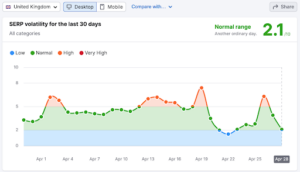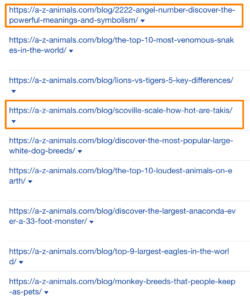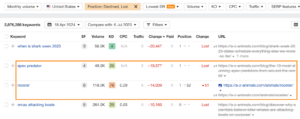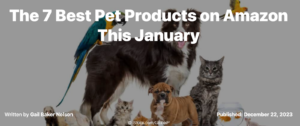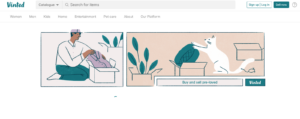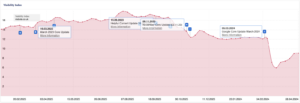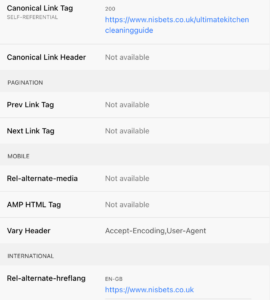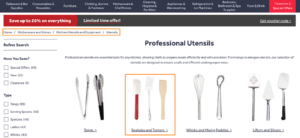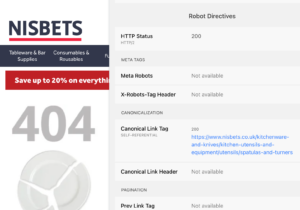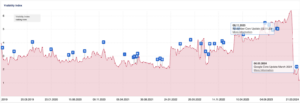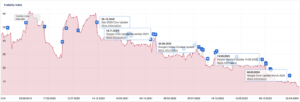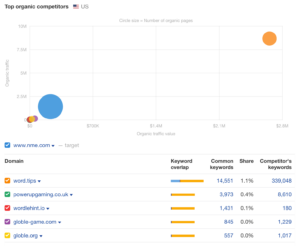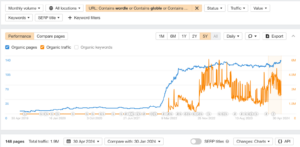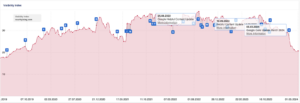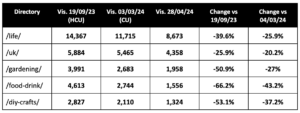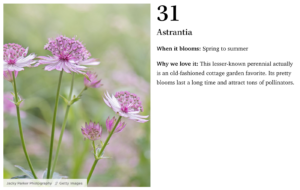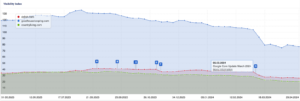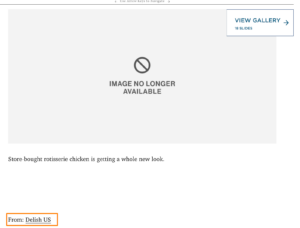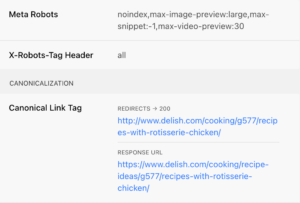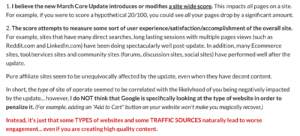Google is taking a major step to enhance the quality and trustworthiness of search results
Google’s algorithm updates serve as pivotal moments that can redefine visibility positively and negatively for websites globally. The March 2024 Spam Update finished rolling out on the 20th of March, with the 2024 Core Update finishing on the 19th April. While the spam update focuses on the quality of the SERPs by removing AI-generated content, it’s still worth noting that the Core update is having an impact similar to previous Core updates.
We have seen significant changes across the board, from de-indexing websites completely to impacting some of the larger and more established brands. We aim to dissect the impact and examine the specific elements contributing to these organic performance drops, with an interesting focus on ecommerce and publisher sites.
The SEO department’s expansion has been remarkable, and witnessing their expertise evolve has been truly gratifying. Jack’s journey as Technical SEO Manager has been nothing short of impressive, and this whitepaper illuminates his remarkable expertise.
Algorithm update timeline:
5th March 2024
The core and spam updates were released, the first of the noted algorithm updates of the year.
6th-8th March 2024
First wave of websites being de-indexed from search results and manual action penalties being issued.
9th March 2024
We see the first big spike in SERP volatility, with desktop seeing higher range of position changes compared to mobile
15th March 2024
Second spike in SERP volatility
20th March 2024
The spam update finished rolling out
25th-26th March 2024
Large volatility spike, noted across the industry by search experts
14th April 2024
Volatility stayed relatively high between the end of March and 14th April, but this date saw surges and drops for a variety of websites.
19th April 2024
Confirmed finish date for the March 2024 Core Update, taking 45 days to roll out in total.
What’s changed with these two algorithm updates?
With the rise of AI content or content scaling growing in popularity, it seemed inevitable that Google would provide an update to attempt to combat the tactic. Google announced in the release document that we are likely to see big changes in the SERPs:
Based on our evaluations, we expect that the combination of this update and our previous efforts will collectively reduce low-quality, unoriginal content in search results by 40%
The three new spam policies cover:
01
Expire domain abuse
Purchasing an expired domain that previously had SEO value and authority to manipulate search results by publishing low-quality content that has little or no value to users.
02
Scaled content abuse
The practice of generating large amounts of pages for the purpose of manipulating search results. The content generated is likely to be unoriginal and has little or no value to users.
03
Site reputation abuse
When third-party pages such as sponsored, advertising or partner pages are published on another website that is different from the purpose of the first-party website to manipulate search results by taking advantage of the first-party website’s ranking signals. Google gives some good examples, such as:
An educational site hosting a page about reviews of payday loans written by a third-party that distributes the same page to other sites across the web, with the main purpose of manipulating search rankings
Example: Animal glossary site suffers an 85% drop in visibility
Taking a look at a real-life example of a site that has been benefiting from these tactics and has now been penalised. According to Sistrix, https://a-z-animals.com is a domain that has seen the biggest visibility loss, at a staggering 85% in the UK comparing the 5th March vs 28th April.
The website has seen a lot of turbulence in its visibility over the last four years. With spikes and drops corresponding quite clearly to the core, spam and helpful content updates:
UP
Core Update November 2021
UP
Core Update May 2022
DOWN
Helpful Content Update August 2022
DOWN
Core Update September 2022
UP
Spam Update October 2022
UP
Helpful Content Update December 2022
UP
Core Update March 2023
DOWN
Core Update August 2023
DOWN
Helpful Content Update September 2023
DOWN
Spam Update October 2023
DOWN
Core Update October 2023
DOWN
Core Update November 2023
DOWN
Spam / Core Update March 2024
The March Core / Spam Updates have caused visibility to drop off a cliff and it brings them back down to visibility levels they had in 2020.
How does that impact the website’s traffic?
The number of organic pages continued to increase until January 2024, when the site peaked at roughly 50,000 pages, with it now dropping down to roughly 38,000. However, organic traffic has gone from a peak of 10 million estimated visits in July 2023 to 7.1 million in February 2024, and now dwindles at 865,000.
Ranking organic keywords followed a similar trend, from a peak of 4.1 million keywords in July 2023 to 3 million in Feb 2024, dropping down now to a relatively pitiful 977,000.
When taking a deeper dive into the content that has been impacted, we can start to see why Google might class this website as spam or unhelpful. For a website focused on animals, and despite having a ‘places’ section within the main navigation, there is a clear disconnect between animals and “angel numbers” or “how hot are takis’.
It’s interesting to see that the content Google hasn’t removed are the pages that fit best with what the website originally offered – ‘Animals beginning with..’:
But this has also impacted pages/keywords that really are relevant to the website, such as ‘apex predator’ or ‘roosters’ , which are both extremely high volume keywords that have historically ranked 1st. This is a warning sign that Google could impact the website as a whole rather than individual pages that have no relevance.
Even the mere indication or suspicion, driven by duplication of content, is enough to signal to Google that this content isn’t helpful to the reader: for example, in the Apex Predator post that dropped in rankings, one of the first paragraphs is nearly duplicated word for word.
The site is also littered with affiliate pages, with no use other than to send users away from the website to unrelated destinations, including Amazon and Walmart. Is this useful for the user, or another tactic to game the SERPs to profit from rankings?
What major brands have been impacted?
We’ve taken key learning from major brands who have gained and lost from the latest update, to improve our own practices. Here’s what our initial audit has found:
Clarks
Clarks is a stand out example of a site that has been scrutinised heavily as a result of multiple site migrations in the past few years. Sistrix published a great analysis in 2020 on the migration of their European domains, but they are once again experiencing problems.
Our investigation has looked specifically at the clarks.com domain, which looks like in September 2023, they migrated the clarks.co.uk domain and the clarksusa.com domain into clarks.com.
Prior to the migration in September, clarks.com seemed to 301 redirect to clarksusa.com:
Its visibility in the UK positively benefitted when the switchover happened, in conjunction with the September 2023 Helpful Content Update. However, the most recent drop started the week before the March 2024 Core Update, and whilst not conclusive, we suspect, due to a lack of recovery since, that the Core Update has negatively impacted Clarks.com long-term.
Vinted
The insurmountable rise of Vinted was further bolstered by a huge spike in visibility around the time of the March 2023 Core Update, however, they have since suffered a reversal resulting from the August / September 2023 updates:
Since September 2023, pages sitting under /brand/ have experienced the biggest drop. At this point the website had over 20,000 /brand/ pages, estimated to be driving over 125,000 organic sessions. 19,846 have been removed or redirected to a new URL, which has had a significant impact on the expected traffic, which is now as low as 3,500 organic sessions.
Key Observations
The site went through a major URL restructure:
https://www.vinted.co.uk/women/ to https://www.vinted.co.uk/catalog/1904-women/ , and unfortunately it looks like redirects haven’t been put in place. The original women’s directory had over 170,000 pages at one point, driving the initial huge visibility increase and subsequent crash.
Simply, the new URL structure doesn’t make sense. Instead of the logical structure of: /catalog/1904-women/jumpers, now each sub category stems directly from the /catalog/ directory: https://www.vinted.co.uk/catalog/13-jumpers-and-sweaters/catalog/13-jumpers-and-sweaters
These category pages aren’t optimised correctly, the H1 being: ‘Jumpers & Sweaters’ instead of ‘Womens’ Jumpers & Sweaters’.
The page has two canonical tags (luckily they are both correct), and the site has hreflang implementation, which looks to be set up correctly. However the URL structure for each translated site is still in english even though the content is translated: https://www.vinted.fr/catalog/13-jumpers-and-sweaters
Looking at the individual brand URL structure, the top level directory page https://www.vinted.co.uk/brand 404s, however https://www.vinted.co.uk/brands does exist and works. Despite this, there’s no breadcrumb on any of the individual brand pages and it’s not easy to find the /brands/ URL as it’s not linked in the main navigation.
However, one of the critical issues Vinted faces is not having any content server-side rendered. This is the same category with JS disabled:
The question is, does Google read JS sites properly? Although Google insists it ‘can’, I’ve seen plenty of sites (and fixed plenty) where enabling server-side rendering has improved how Google crawls and indexes JS sites.
So although Vinted have seen drops from these recent updates, it could likely be down to a combination of getting the basics wrong, in addition to content being unhelpful or spam.
Nisbets
Nisbets has enjoyed stable visibility in the past 5 years, however, they started to see a decline as a result of the Helpful Content update in September 2023. They were further penalised by March’s update, with a total visibility loss of 26%.
The whole website was hit:
Since it’s peak in keyword rankings in August 2023, the site has lost 62,000 keyword rankings, most of which were associated with product pages:
This isn’t just an issue for the .co.uk domain, it’s a widespread issue for all markets, including nisbets.ie, nisbets.fr and nisbets.com.au.
The brand is globally renowned, and the site is trustworthy with ample product reviews. However, there are some technical problems we would assume could be a factor as to why they have been dropped with this update:
Hreflang implementation
Take this PLP as an example: https://www.nisbets.co.uk/kitchenware-and-knives/kitchen-utensils-and-equipment/utensils/spatulas-and-turners/_/a33-4
The page does have hreflang implemented, but only to itself and Ireland:
The Australian version does exist, but has no hreflang setup. The same issue persists across PDPs: https://www.nisbets.com.au/kitchenware-and-storage/kitchen-utensils-and-tools/chef-tools-and-serving-utensils/spatulas-and-turners/_/a33-4
Blog posts such as https://www.nisbets.co.uk/ultimatekitchencleaningguide have self-referencing canonical tags but hreflang implementation setup to the homepage.
XML Sitemaps
The XML sitemap contains an old version of the URL which redirects:
User Journey & Internal Linking
The user journey is convoluted and unnecessarily long. With no product listing pages within the main navigation, it takes 4 clicks to get to through doorway pages:
Indexation Control & 404s
Another penalising factor will be that existing 404s actually have a 200 status and a self-referencing canonical tag. Take: https://www.nisbets.co.uk/kitchenware-and-knives/kitchen-utensils-and-equipment/utensils/spatulas-and-turners as an example.
The combination of an ‘acceptable’ user experience, with plenty of room for improvement, and significant technical issues, it’s no wonder Google is having trouble understanding which pages it should crawl and index.
Oakley
Oakley is, potentially, the most stark example of a website that has taken a huge hit since the last algorithm update. In truth, since January 2024, it has dropped off a cliff:
The website has historically, consistently ranked in the top 5 for broad keywords which are highly relevant, such as Sunglasses, for which it was ranking position 2. This has suddenly dropped completely, and not just within the UK:
The site is continuing to drop, losing more rankings and traffic by the day, with no clear reason as to why Google would suddenly drop the website. The site has hreflang setup, canonicals, product structured data, but potentially some key issues with the navigation, rendering, robots.txt setup and how Google can crawl / index the site.
NME.com
The NME website has been in a constant state of visibility decline for the last 4 years, following the December 2020 Core Update. Since that date, the website has been penalised by every major update:
With the brand founded in 1952 as a newspaper, the NME website launched in 1996, so as a brand, has had a long standing history and brand authority. Interestingly the brand was acquired in 2019, which could have hastened its decline.
Key Observations
Despite being a well established music brand, tools like Ahrefs class it’s organic competitors as gaming websites:
Half of the top organic pages are related to looking at the results of daily games like Wordle and Globle. The top organic page is estimated to drive more than 50% of the whole website’s traffic and is strangely, a Wordle results page.
There are less than 150 pages relating to these online games, which started to gain traction in 2021:
The site has other directories such as /discount-codes/ which could signal to Google they are conducting ‘site reputation abuse’ from the spam update. With major brands like Forbes already blocking Google from it’s discount codes section to mitigate the update being rolled out on the 5th May, NME would likely benefit from making the same change. We’ll be keeping a close eye on this as the next update looms.
Countryliving.com, Delish.com & Goodhousekeeping.com
Another publisher impacted by this update is countryliving.com, although organic visibility has been for the most part consistent over the last 5 years, there has been a decline following both the Helpful Content Updates in August 2022 and September 2023. The latest update has seen their traffic decline by 27%.
This seems to have impacted one directory more than others:
While there are no obvious technical, content or UX-based reasons that would be driving this decline, we suspect it could align with Google pushing more of an ecommerce intent in the SERPs. For example, the site consistently ranked in the top 3 for the keyword ‘flowers’ in the US but no longer ranks in the top 100.
Comparing rankings and SERPs as a result of the Helpful Content update in September 2023 with the most recent update on the 30th April 2024, the mixture of intent could be accountable for its decline, with the latest SERP favouring commercial and transactional websites.
The page that ranked has also changed since September, previously it was “62 Best Types of Flowers (With Pictures!) for Your Garden” which has now increased to “86 Best Types of Flowers (With Pictures!) for Your Garden”.
When you compare the older version to the latest update, in a lot of instances, the content has been improved. The old post had minimal content for each flower and a small amount of related content, but it was in alphabetical order which could have been easier to follow for the reader.
The new update is numbered for each flower, and in some cases contains more content with greater relevance to that specific flower.
However, there is no order to the list, e.g. alphabetical order, colour, season it blooms or how easy it is to look after, and as you get further down the list, the amount of information for each flower has not increased since the original post. So, while the content isn’t necessarily poor, increasing the amount of content for this post doesn’t make it more useful.
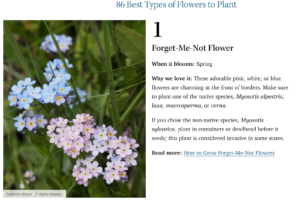
Delish.com has suffered the same fate as countryliving.com – a decline in visibility starting from the algorithm updates in August 2023.
Delish and Country Living are owned by the same company Hearst. Which led us to look at other brands within this network such as Good Housekeeping. Again, it follows the same trend and in fact, Good Housekeeping has seen a bigger drop:
These three sites in some cases have very similar content:
- https://www.delish.com/cooking/recipe-ideas/g577/recipes-with-rotisserie-chicken/
- https://www.countryliving.com/food-drinks/g2811/recipes-with-rotisserie-chicken/
- https://www.goodhousekeeping.com/food-recipes/easy/g32160791/leftover-rotisserie-chicken-recipes/
The Country Living post is old and no longer has content on it, it even links to the Delish version:
What’s worse is that the Country Living post is set to Noindex but has a canonical pointing to the Delish post
Summary
What has been one of the biggest algorithm updates we’ve ever seen, is the change from sites which previously were performing well perhaps down to link acquisition or brand advantages who are no longer being rewarded for low quality, unhelpful content.
Some incredible research pieces are starting to emerge following this update, from the likes of Eric Lancheres which covers some of the sites / topics mentioned here. We love his theory around sites that are going the extra mile to engage users, keep users on site and prioritising slick and frictionless user journeys, in addition to acquiring traffic from other sources such as social media and email, driving positive gains since the update:
From StrategiQ’s perspective the core update has been seen to reward sites for making the kind of changes that our strategies are centred around: building meaningful relationships with customers, proving expertise from a brand perspective, and sharing content with customers that helps them to better understand the products and services offered by our clients, and ultimately drive business growth.
What to do if you’ve been impacted by this update?
If you have seen a decline in traffic or visibility from this most recent update, get in touch today to speak to our experts for a site audit and strategy – it’s always strategy.

